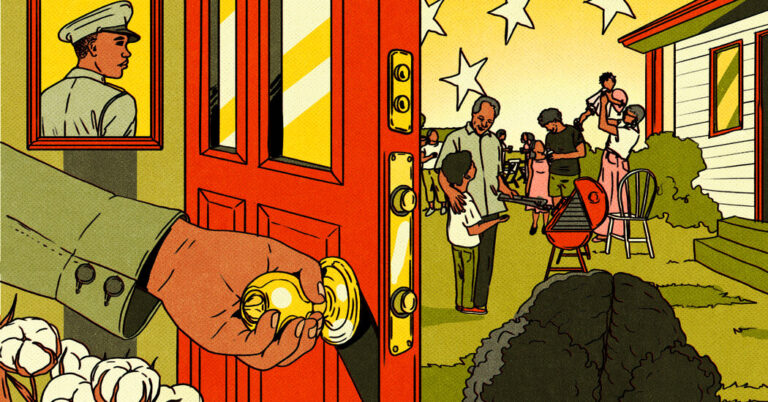It wasn’t patriotism that drove my grandfather to the Army recruiting office in 1956. It was poverty that drove him. After spending his youth picking cotton and doing odd jobs to help support his family, he was far from graduating from high school as he approached his 18th birthday. He wanted a better life, and he saw the military as a way to get there.
He ended up staying three years beyond his initial enlistment. A sepia-toned photo of him in uniform still hangs proudly in his bedroom in Huntsville, Alabama.
For my grandfather, military life was not without its challenges. He recalls that he and other black soldiers were constantly called “boys” until he stood up and told his commander that there were only men in their unit. After the tense and even dangerous exchange, the officer addressed them respectfully—a small triumph my grandfather never forgot.
I asked him why he continued, and he said, “I think I liked America more than I thought I would. I definitely liked it more than Russia.”
The Army was the first integrated space he encountered. “We served together, marched together, slept in the same barracks and learned to respect each other,” he said. During his six years in the service, he finished high school and took additional courses. He returned to civilian life with degrees to become a firefighter, a merchant marine and an accountant. But in 1960s Alabama, no one would refuse to hire him to do any of those things. His first job was as a janitor.
My grandfather’s feelings about America are alternately affectionate and critical. He loved his unity and the times when the white men he served with treated him as an equal. He also regrets the times when he didn’t, especially in the civil war years that followed. Today, at 86, he comes alive as he talks about how he never got to be a firefighter.
His story embodies the great contradiction of America, which is both a land of opportunity and a land that too many times hampers it.
To my kids, he’s almost a mythical figure out of American history books. For all he’s become — he opened his own music store in the 1990s — he can’t help but think he could have been even more.
It represents my children’s connection to a past they don’t really understand.
My children aren’t the only ones who don’t know what to make of my grandfather’s story or his complex form of patriotism that clings to affection despite a deep sense of betrayal.
In this country, we have come to view patriotism as a positive version of our history that makes light of the nation’s sins. The Fourth of July in particular is a time to wrap ourselves in the flag, grill meat, and listen to a playlist of songs with lyrics that praise America. Talk of slavery, Jim Crow, economic exploitation, and what happened to black soldiers after their service spoils the mood.
It costs nothing to sing “God Bless America.” It takes a lot more to believe in a place that has betrayed you.
As an African American speaking out about anti-Black racism, I often hear the refrain: “If you hate America so much, you should leave.” But I don’t tell my grandfather’s story because I hate America. I tell it because omitting stories like his would only keep our country from becoming a better place. On the other side of honesty is the possibility of change. For me, telling the truth is the most hopeful form of patriotism.
Too often we fear that if we tell our children our complex and sometimes dark history, they will respond with debilitating shame. But instead of lying to our young people, we can give them a task that demands the best of them. We can ask them to bridge the often yawning gap between our ideals and our practices. This is the gift the past offers us, a chance to flee old evils and seek new goods.
It is not enough to imagine ourselves on the road with Paul Revere shouting warnings against the redcoats or huddled on the boats preparing to storm the beaches of Normandy. We must recognize that the freedom Revere helped win was won by some Americans, not all. We must recognize that the freedom Revere helped win was won by some Americans, not all. African-Americans Those who risked their lives on this beach in France returned to a racially segregated country where they were the targets of lynching.
This year, my mother’s family will have a family reunion on the Fourth of July weekend. We’ll have a cookout and fireworks like everyone else. We might even listen to Marvin Gaye Or Whitney Houston playing the national anthem while we wait for the meat to finish cooking.
There will also be criticism of this country, especially in this election period. That will not be all we have to say. We will talk about the long road traveled by my family From the plantation to the freedom we enjoy today. This story contains its own mix of tragedy and triumph. We will talk about my grandfather’s service as well as that of his father and two of his uncles, all three of whom fought in World War II. In my generation, a cousin also served.
These emotions of love, pride and regret can coexist in the same heart. This is the truest form of patriotism, a love that is not complacent, that demands more than crumbs from the table of justice.


